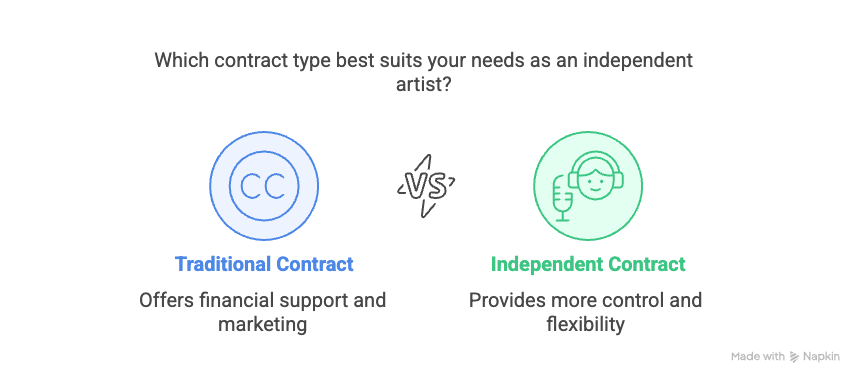
Recording Contracts For Independent Artists: What You Need
Last Updated on May 11, 2025
For independent artists, a recording contract can feel like both a dream and a risk. It’s your ticket to getting your music professionally produced and distributed-but also a legal agreement that affects your ownership, royalties, and creative control.
This guide explains the key elements every indie artist should understand before signing a recording deal, and how to protect your interests.
1. What Is a Recording Contract (and Why It Matters for Indies)?
A recording contract is a legal agreement between an artist and a label, producer, or investor. It outlines how recordings will be created, who owns the results, how income is split, and what the obligations are for both sides.
For indie artists, these contracts often come from small labels, independent producers, or even self-funded collaborations. Understanding what you're agreeing to is critical.
2. Key Clauses You Must Understand Before Signing
Master Ownership
Who owns the master recordings? If it’s the label, they control how your music is licensed and monetized. Aim for shared or retained ownership if possible.
Royalty Terms
Check how revenue will be split: Are you paid a flat fee or a percentage? Is it from gross or net income? Are expenses recouped before you get paid?
Recording Commitments
How many tracks are required? What are the deadlines? Make sure the expectations are realistic for your workflow and budget.
Exclusivity
Does the deal prevent you from releasing other music independently? Some indie deals demand exclusivity without offering much in return-read closely.
Termination Rights
Can you exit the agreement if things go sideways? Look for clear exit clauses and avoid contracts that lock you in indefinitely.
3. Red Flags in Indie Recording Deals
- No clear recoupment clause: You may owe money before seeing any royalties.
- Ownership transfer without negotiation: Some contracts make the label the sole owner without compensation.
- No audit or accounting rights: You should have the right to verify royalty payments.
- Long-term exclusivity with vague deliverables: Avoid being locked in with no clear milestones.
4. How to Negotiate as an Independent Artist
- Ask for a short-term deal first (e.g., one project or EP) instead of multi-year contracts.
- Retain or share master rights where possible.
- Request payment transparency, including access to royalty statements and accounting.
- Consult a music lawyer before signing, even if the deal looks small.
5. Bonus: When Self-Releasing Might Be the Better Option
If the contract doesn’t give you funding, marketing, or distribution support-and you’re giving up rights-it may not be worth it.
Many indie artists succeed today by self-releasing via platforms like DistroKid, TuneCore, or Bandcamp while keeping full ownership and revenue.
Final Thoughts
A good recording deal should help your career, not restrict it. Understand the contract, negotiate what matters, and never sign under pressure. When in doubt, walk away—or get it reviewed.
Need a professional recording contract template? Download it free here.
Download the Free General Template
Ready to apply what you've learned? Get instant access to the General PDF - free, editable, and built for Canadian businesses. No sign-up required.
Frequently Asked Questions
Answers to common questions about Recording Contracts For Independent Artists: What You Need.
Should independent artists sign a recording contract?
Only if it offers clear value-such as funding, promotion, or distribution-without giving up too much control or ownership.
What’s a fair royalty percentage for indie artists?
Many indie deals offer 50/50 net revenue splits, but terms vary. Always negotiate and understand how expenses are deducted.
Can I negotiate master ownership in an indie deal?
Yes. In fact, many indie artists retain full or shared ownership-especially in self-funded or collaborative projects.
What if a label wants exclusive rights to my music?
Evaluate what they’re offering in return. If there’s no marketing or funding, exclusivity may not be worth it.
Do I need a lawyer to review the contract?
Absolutely. Even small indie deals can include legal traps that affect your future income and rights.
Can I get out of a bad contract later?
Only if there’s a termination clause or the contract is legally unenforceable. Read terms carefully before signing.
Is it better to self-release instead of signing?
If you have a fan base and the means to distribute your music, self-releasing lets you keep 100% of rights and profits.
What should I ask a label before signing?
Ask about funding, promotion, royalties, deliverables, and how long they expect to control your music.
Are digital signatures valid on music contracts?
Yes. In Canada, digitally signed contracts are enforceable as long as both parties agree.
Where can I find a contract template for indie artists?
Right here. Download our free music recording contract template designed for independent musicians.
Explore More in General
Discover curated templates in General to help your business stay compliant and efficient.